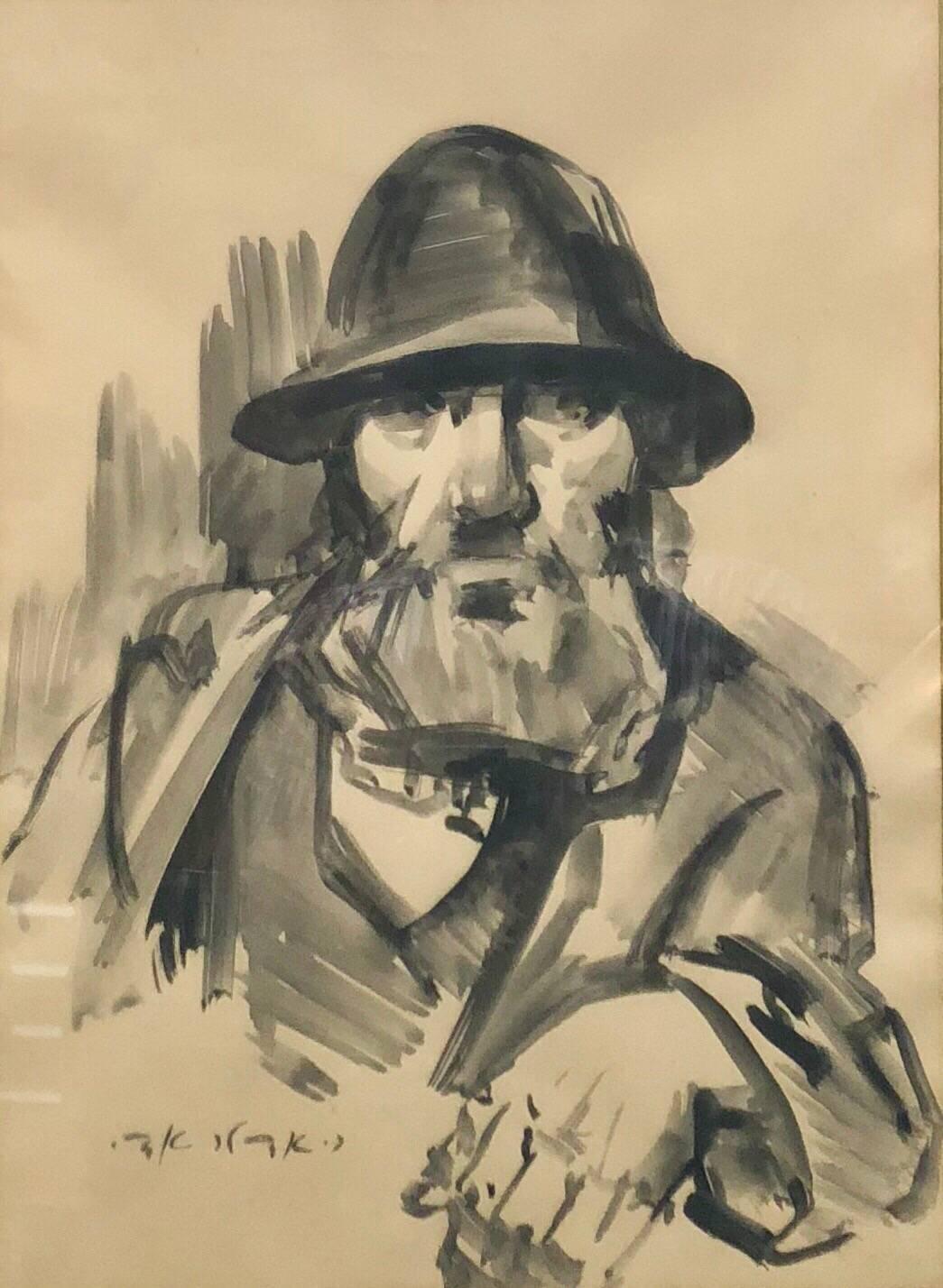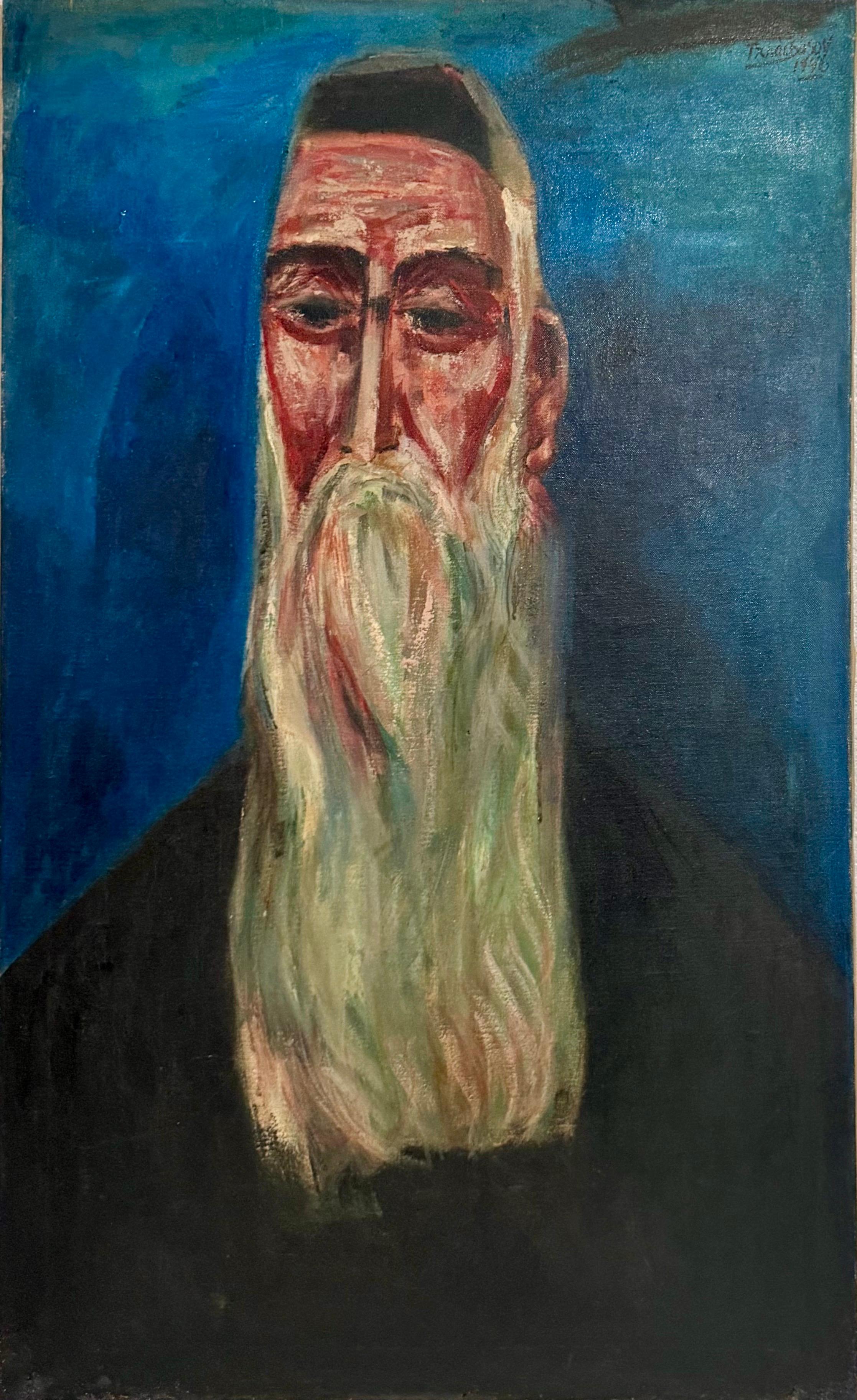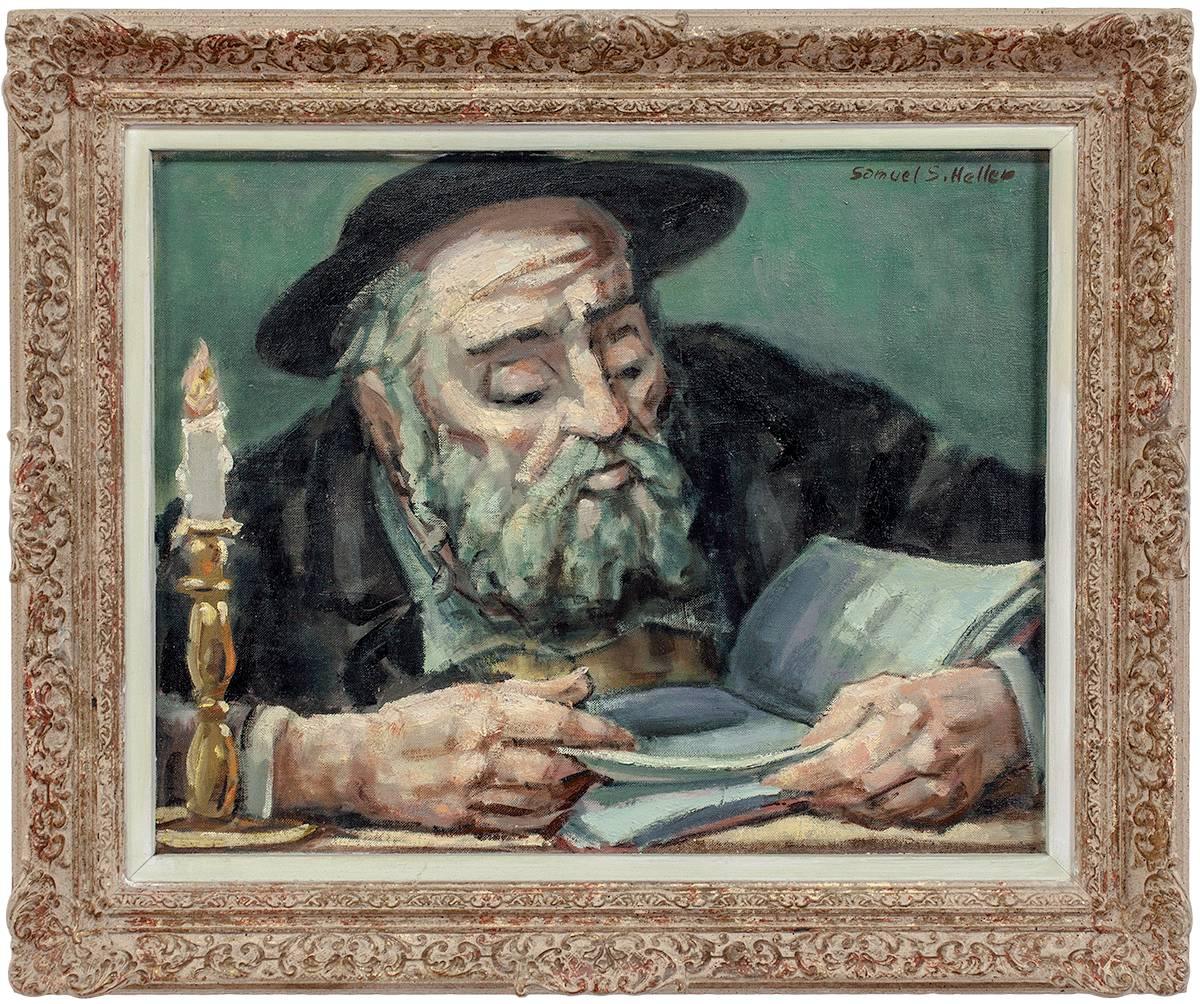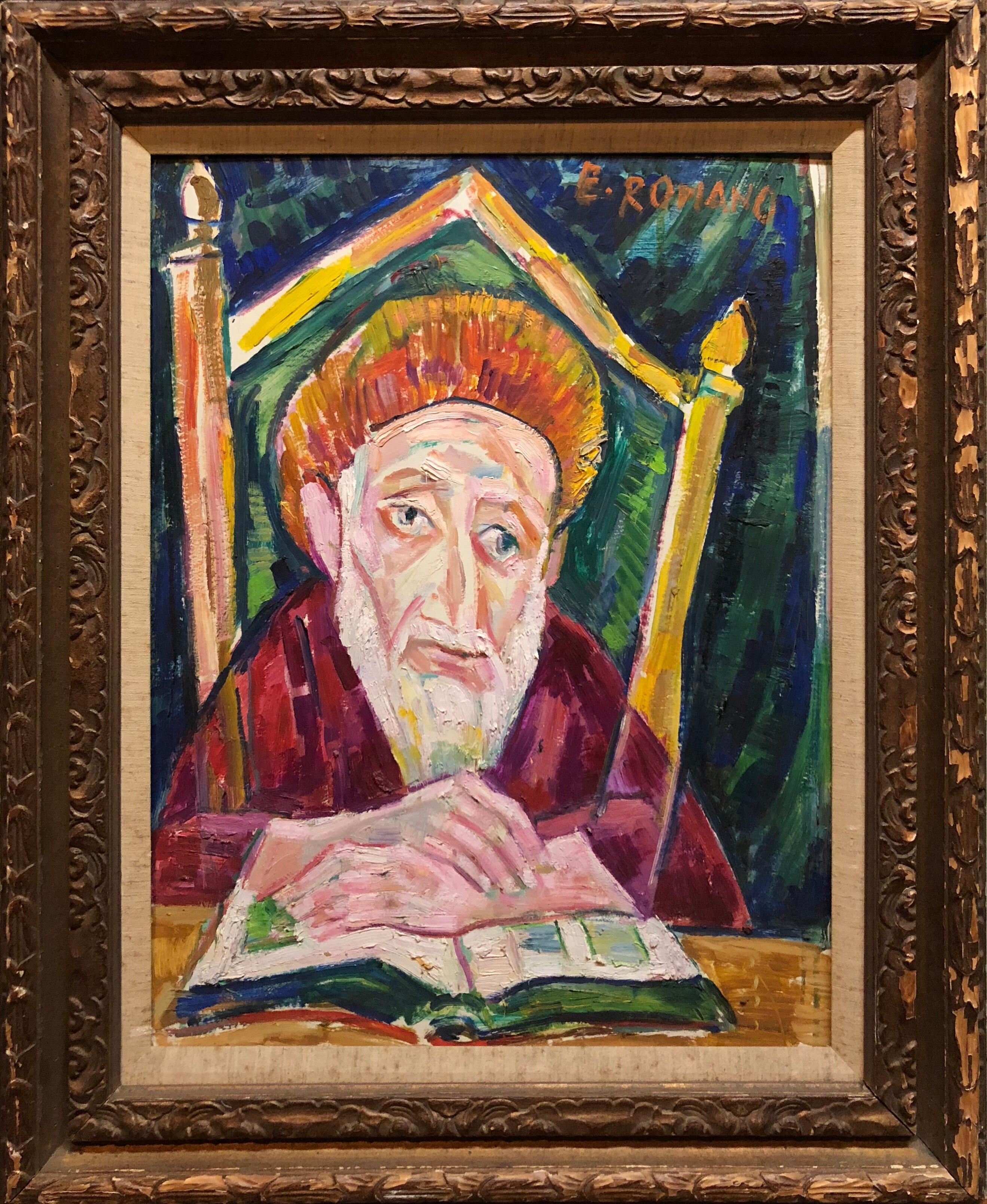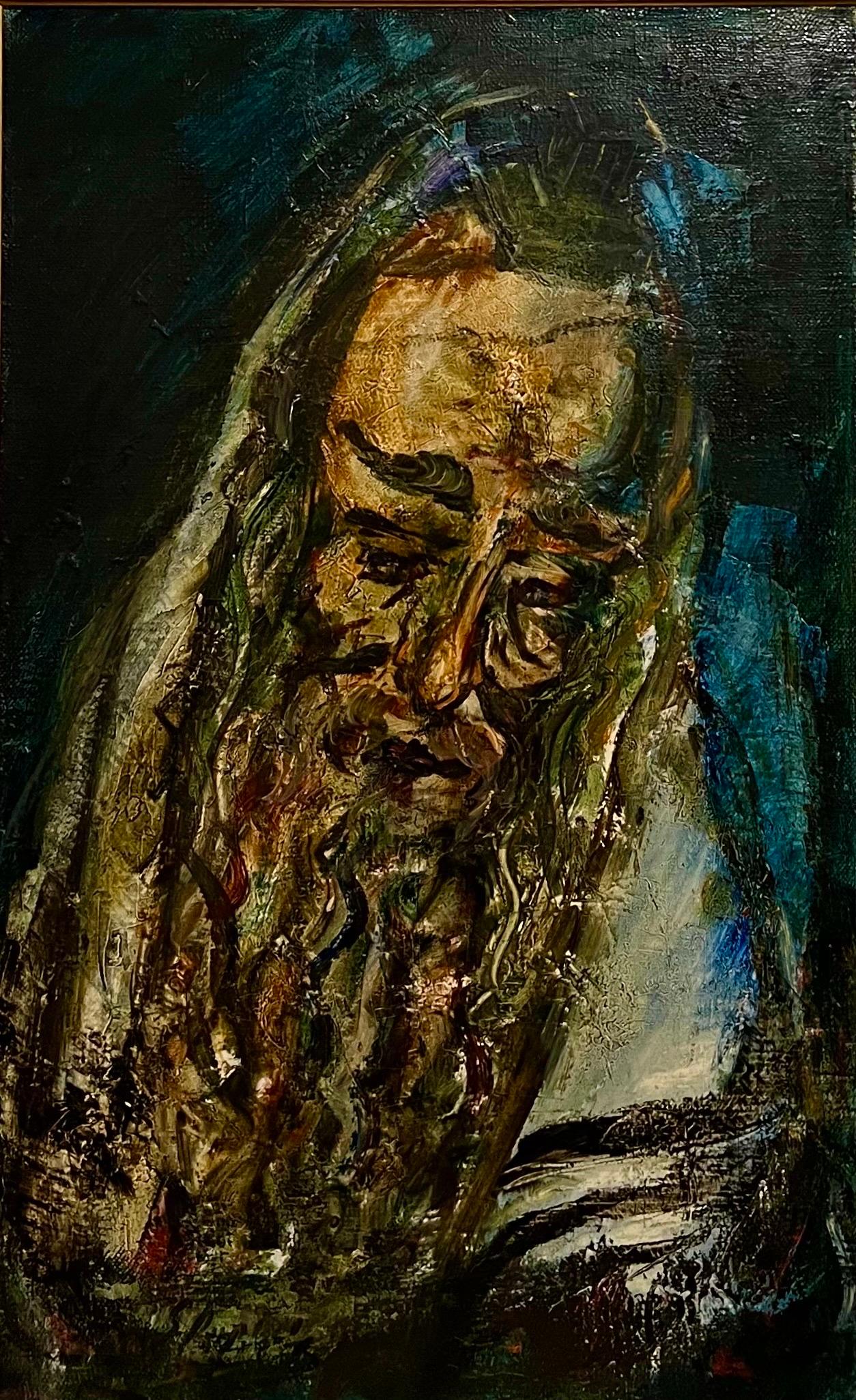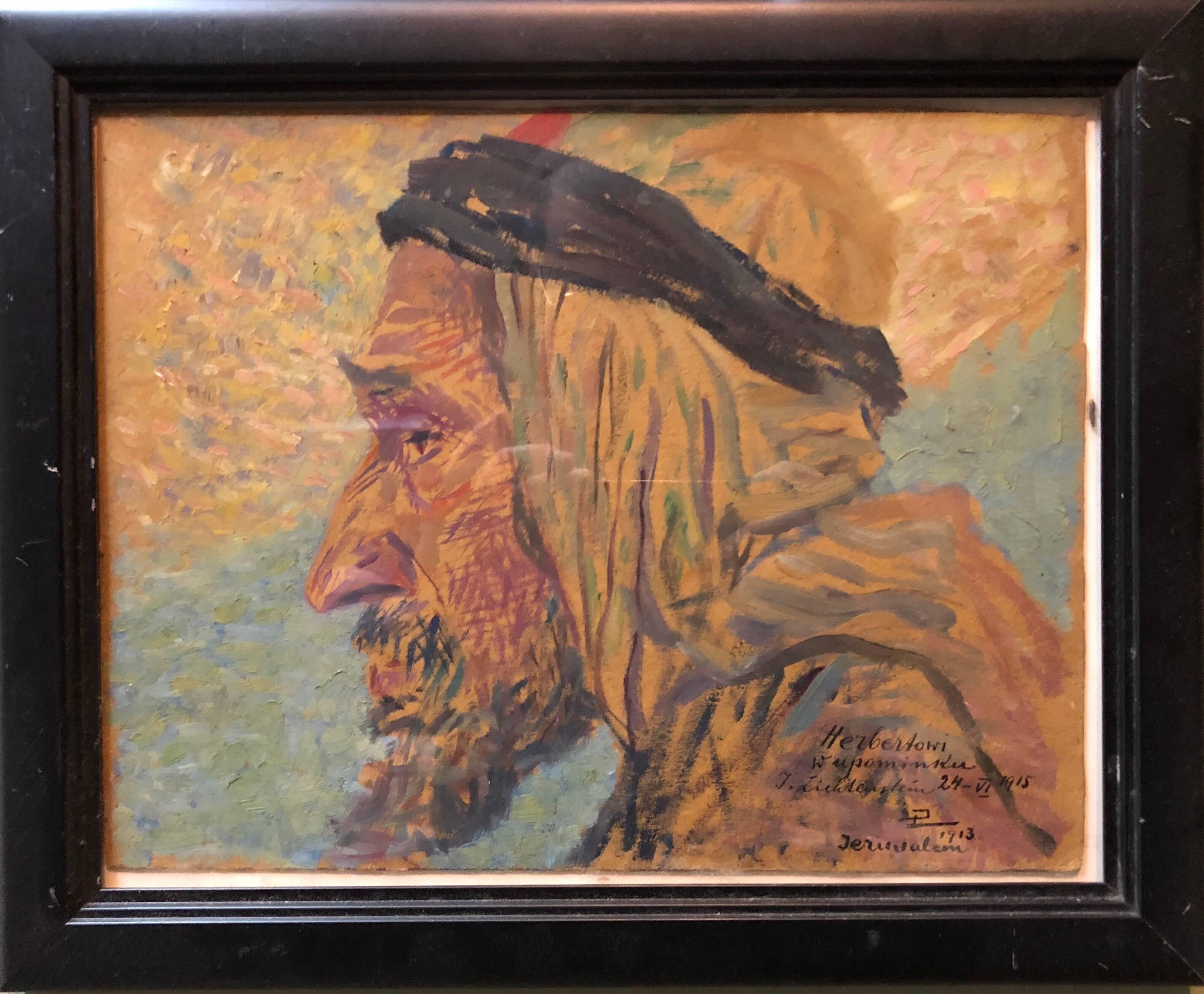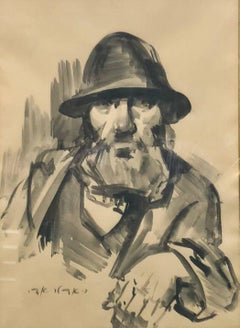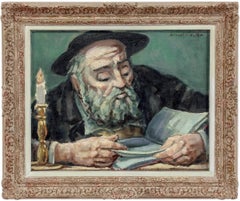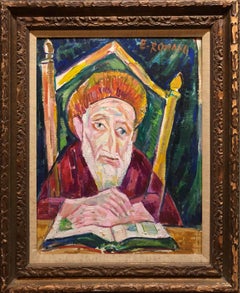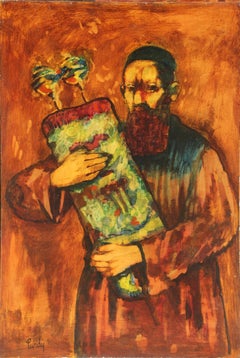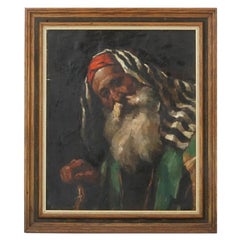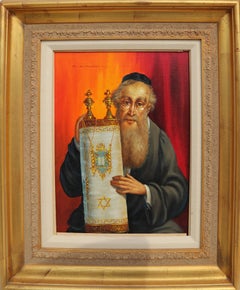Items Similar to Judaica Oil Painting 1945 Palestine Old Jewish Man Polish Israeli Artist
Want more images or videos?
Request additional images or videos from the seller
1 of 11
Ozer ShabatJudaica Oil Painting 1945 Palestine Old Jewish Man Polish Israeli Artist1945
1945
$2,200
£1,682.02
€1,937.34
CA$3,082.87
A$3,441.74
CHF 1,803.42
MX$42,130.27
NOK 22,903.45
SEK 21,595.04
DKK 14,458.60
Shipping
Retrieving quote...The 1stDibs Promise:
Authenticity Guarantee,
Money-Back Guarantee,
24-Hour Cancellation
About the Item
Ozer Shabat 1978-1901
Ozer Shabbat was an Israeli painter, a resident of Haifa. Belonged to the Palestine Expressionist group of the late 1920s and early 1930s.
Shabbat was born in Wolbrom, Poland. At the end of the First World War he went to Holland for agricultural training in the framework of the HeChalutz movement, prior to his immigration to Palestine. In 1920 he immigrated to Eretz Israel and joined the Hulda group. Later he joined the Merhavia group and there he began painting. Because of his desire to study drawing, he left the group and moved to Jerusalem. In 1921, he wrote articles in the newspaper "HaSadeh" on the subject of agriculture and Dutch cheese.
Ozer Shabath won the first prize in a competition for the design of the Dutch Consulate's Garden in Jerusalem, enabling him to travel to Paris in 1923 to study painting. Until 1925 he studied painting at the Grande Chaumiere Academy in Paris. This year he returned to Eretz Israel and settled in Haifa, where he lived until his death.
In 1928 he participated for the first time in an exhibition of Eretz Israel artists at the Tower of David. Since then he has participated in all the general exhibitions of Israeli artists. In 1934, together with painters Menachem Shemi, Avraham Mohar, Zvi Meirovitch and others, he founded the Haifa Artists' Group. In 1935-36 he toured Europe and visited Italy, France and England. During his visit, he maintained contacts with artists from the Jewish school of Paris.
He has exhibited in several solo exhibitions, represented Israel in exhibitions in Europe and participated in international exhibitions in New York, Johannesburg and Zurich. In 1958 he represented Israel in the Venice Biennale. In 1960, Shabat, together with Elchanan Halpern he represented the Israeli Painters Association at the International Congress of Plastic Arts held in Vienna, Austria . In the 40s and 50s he focused on landscape pictures. However, despite the focus on the Israeli landscape, the approach is universal in the framework of the post-Impressionist painting school. In the 1960s, his approach changed and he turned more to abstraction. The abstract direction gradually evolved. The point of departure of the abstract approach is the architectural landscape, but this view loses its real character and becomes only imaginary: the buildings lose their real character and turn into exclusive geometric areas that are usually set against a dark background. Over time, architecture captured the lion's share of his paintings. Cities like Safed, Jaffa and Jerusalem are the subject of many pictures.
He taught painting and art at the schools of the kibbutzim in Ramat Yochanan and Kfar Yehoshua, in high schools in Haifa and in the IDF and Gordon seminars.
His paintings were purchased and are in the permanent collection of the Bezalel National Museum (now the Israel Museum), Haifa Museum of Art, Haifa Maritime Museum, Acre Municipal Museum.
Select Solo exhibitions
1936 - Nadler Gallery, Haifa.
1943 - The Tel Aviv Museum of Art.
1952 - Artists House, Haifa.
1953 - Bezalel House, Jerusalem.
1955 - Gallery in Geneva, Switzerland.
1955 - The Writers' Club, Haifa.
1959 - Artists House, Haifa.
1960 - Museum of Modern Art, Haifa.
1962 - Museum of Modern Art, Haifa.
1963 - Gallery 220, Tel Aviv.
1968 - The Municipal Museum of Beit Emanuel, Ramat Gan.
1979 - Memorial exhibition marking the first anniversary of his death, Haifa Auditorium, Haifa
1983 - Memorial Exhibition, Holon Museum of Art.
Awards
1944 - Shabtai Levy Prize, Mayor of Haifa.
1948 - Haifa Municipality Prize.
1950 Hermann Struck Prize.
1963 - Tiberias Municipality Prize.
Collective Annual Exhibition by Palestinian Artists, Art Gallery of the ''Habima'' Building, Tel Aviv
1944. Artists: Hermann Struck, Aaron Priver, Itzhak Danziger, Zvi Aldouby, Rico Blass, Moshe Castel, Mordechai Levanon, Genia Berger, Arie Orland, Aharon Avni, Lea Grundig and others.
- Creator:Ozer Shabat (1901 - 1978, Israeli, Polish)
- Creation Year:1945
- Dimensions:Height: 22.5 in (57.15 cm)Width: 19 in (48.26 cm)
- Medium:
- Movement & Style:
- Period:
- Condition:needs new mat, craquelure.
- Gallery Location:Surfside, FL
- Reference Number:1stDibs: LU38213152462
About the Seller
4.9
Platinum Seller
Premium sellers with a 4.7+ rating and 24-hour response times
Established in 1995
1stDibs seller since 2014
1,784 sales on 1stDibs
Typical response time: <1 hour
- ShippingRetrieving quote...Shipping from: Surfside, FL
- Return Policy
Authenticity Guarantee
In the unlikely event there’s an issue with an item’s authenticity, contact us within 1 year for a full refund. DetailsMoney-Back Guarantee
If your item is not as described, is damaged in transit, or does not arrive, contact us within 7 days for a full refund. Details24-Hour Cancellation
You have a 24-hour grace period in which to reconsider your purchase, with no questions asked.Vetted Professional Sellers
Our world-class sellers must adhere to strict standards for service and quality, maintaining the integrity of our listings.Price-Match Guarantee
If you find that a seller listed the same item for a lower price elsewhere, we’ll match it.Trusted Global Delivery
Our best-in-class carrier network provides specialized shipping options worldwide, including custom delivery.More From This Seller
View AllIsraeli Judaica Rabbi Expressionist Gouachel Painting
By Adolf Adler
Located in Surfside, FL
size includes frame
Adolf Adler 1917 - 1996
Adolf Adi Adler was born in Romania in 1917. Attended the Art College of Kluj Romania in 1950. (in Satu Mare, original home city of the Satmar Hasidic group). In 1963, Adler was chief among a group of well known artists who immigrated to Israel. He was awarded the Nordau prize in 1978. He works have been auctioned at Sloan's Auction House in Maryland and Karrenbauer Auction House in Germany and today are represented in the Yad Vashem Holocaust Museum in Jerusalem. In 1984, a retrospective of his work was held in Rishon Le Zion. He died in 1996.
Awards and Prizes
1993 Mordecai Ish-Shalom Prize, Artists House...
Category
Mid-20th Century Expressionist Figurative Paintings
Materials
Paper, Gouache
Rare 1946 WWII Judaica Abstract Oil Painting Nahum Tschacbasov WPA Artist Rabbi
By Nahum Tschacbasov
Located in Surfside, FL
Nahum Tschacbasov
Russian American, 1899-1984
Portrait of a Jewish Man, Rabbi
Oil on canvas
Hand signed and dated upper right. Unframed
Canvas 44 x 26.75 in
Provenance: Stuttman Gall...
Category
1970s Abstract Abstract Paintings
Materials
Canvas, Oil
Rare Judaica Jewish Rabbi Oil Painting
By Samuel Heller
Located in Surfside, FL
Genre: Judaica
Subject: People
Medium: Oil
Surface: Board
Dimensions: 14 1/2" x 19"
Dimensions w/Frame: 20 1/4" x 24 1/4"
Category
Mid-20th Century Impressionist Figurative Paintings
Materials
Oil, Board
Modernist Oil Painting 1940s, Judaica Hasidic Rabbi in Jerusalem
By Emanuel Glicenstein Romano
Located in Surfside, FL
Genre: Portrait
Subject: Landscape
Medium: Oil
Surface: Board
Country: United States
EMANUEL ROMANO
Rome, Italy, b. 1897, d. 1984
Emanuel Glicenstein Romano was born in Rome, September 23, 1897.
His father Henryk Glicenstein was a sculptor and was living in Rome with his wife Helena (born Hirszenberg) when Emanuel was born. His father obtained Italian citizenship and adopted the name Enrico. Emanuel was brought up in Italy, Switzerland, Germany, England and Poland.
In 1926 Emanuel and his father sailed for New York. They briefly visited Chicago. Romano's sister, Beatrice, and mother only joined them in New York years later.
Romano changed his name on his arrival to America and some have erroneously speculated that this was to avoid antisemitic discrimination. In truth, as the son of a highly-regarded artist, Romano changed his name to ensure that any success or recognition he would later attain, would be the result of nothing other than his own merit as an artist, and not on account of his father's fame.
In 1936 Romano was worked for the Federal Art Project creating murals. During and immediately after World War II, Romano created a series of allegorical works depicting graphic holocaust images that were held closely by the family until after his passing. One of these works is now on permanent display in the Florida Holocaust Museum in St. Petersburg Florida.
Emanuel's father died in 1942 in a car accident before they could realize their shared dream of visiting Israel.
In 1944 Romano, having completed his degree at the Pennsylvania Academy of Fine Arts and the Art Institute of Chicago, began teaching at the City College of New York.
Romano moved to Safed, Israel in 1953 and established an art museum in his father's memory, the Glicentein Museum.
COLLECTIONS
Indianapolis Museum of Art
Metropolitan Museum of Art
Boston Fine Arts Museum
Fogg Museum
Musée Nacional de France
Recently his work has been added to the Florida Holocaust Museum collection. His notable works include his holocaust themed allegorical paintings as well as portraits of Marianne Moore, his father and William Carlos Williams...
Category
1970s American Modern Figurative Paintings
Materials
Oil, Board
Large Judaica Jerusalem Oil Painting Israeli Jewish Rabbi Artist Tzvi Raphaely
By Zvi Raphaeli
Located in Surfside, FL
Rabbi Portrait, Oil Painting
Framed: 37.5 x 26. Canvas: 31.5 X 20
Bears original label verso from Safrai Gallery
Lovely Israeli Chassidic Rabbi portrait oil painting, vibrant colorful painting. Hand signed in Hebrew and English. Done in a style similar and influenced by Marc Chagall.
Svi Raphaely (also known as Tzvi Raphaeli...
Category
20th Century Post-Impressionist Figurative Paintings
Materials
Canvas, Oil
Rare Oil Painting Arab Man Bezalel School Jerusalem 1913, Judaica
By Isaac Lichtenstein 1
Located in Surfside, FL
Extremely rare work of art from the early Bezalel School of Boris Schatz in Ottoman Palestine. it depicts an Orientalist Arab Sheik in traditional Headwear.
YITSKHOK LIKHTENSHTEYN ...
Category
Early 20th Century Post-Impressionist Figurative Paintings
Materials
Paper, Oil Pastel, Oil
You May Also Like
Rabbi, Oil Painting by Donald Roy Purdy
By Donald Roy Purdy
Located in Long Island City, NY
Artist: Donald Roy Purdy, American (1924 - )
Title: Rabbi
Year: circa 1960
Medium: Oil on Masonite, signed l.r.
Size: 36 x 24 in. (91.44 x 60.96 cm)
Category
1960s Post-War Figurative Paintings
Materials
Masonite, Oil
$6,000 Sale Price
20% Off
Judaica Hungarian Oil Painting of a Rabbi By Miklos Mihalovits
Located in Long Island City, NY
Miklos Mihalovits, Hungarian, 1888 to 1960, an oil painting on canvas, Portrait of an old Rabbi. Signed lower left. Framed. Miklos Mihalovits is known for Figure, genre paintings. Miklos Mihalovits was a Hungarian painter born in 1888. Miklos pursued his studies at the High School of Applied Arts and the Benczur Master School, in Budapest. He also took in study tours in Italy and Germany. Miklos Mihalovits art is characterized by bright colours and temperamental shaping, which can be seen in his paintings of study heads for biblical compositions and nude figures. His work was exhibited from 1912 on. Miklos also participated in collective exhibitions in Budapest from 1929 through 1930. He was one of the founders of the National Saloon. European Fine Art...
Category
Antique 19th Century Unknown Paintings
Materials
Paint
$2,000 Sale Price
50% Off
Portrait of an Old Man, Modern Oil Painting by Sandu Liberman
By Sandu Liberman
Located in Long Island City, NY
Artist: Sandu Liberman, Romanian/American (1923 - 1977)
Title: Portrait of an Old Man
Year: circa 1970
Medium: Oil on Canvas, signed l.r.
Size: ...
Category
1970s Realist Portrait Paintings
Materials
Oil
Rabbi and Torah, Oil Painting by Abraham Straski
By Abraham Straski
Located in Long Island City, NY
Artist: Abraham Straski, Polish (1903 - 1987)
Title: Rabbi and Torah
Year: circa 1957
Medium: Oil on Canvas, signed l.r.
Image Size: 16 x 12 inches
Frame Size: 26 x 20 inches
Category
1950s Post-War Portrait Paintings
Materials
Canvas, Oil
Rabbi, Modern Oil Painting on Masonite by Donald Roy Purdy
By Donald Roy Purdy
Located in Long Island City, NY
Artist: Donald Roy Purdy, American (1924 - )
Title: Rabbi
Medium: Oil on Masonite, signed l.r.
Size: 36 x 24 in. (91.44 x 60.96 cm)
Category
Late 20th Century Post-War Figurative Paintings
Materials
Masonite, Oil
$4,800 Sale Price
20% Off
Rabbi with Torah, 1970s Oil Painting by Donald Roy Purdy
By Donald Roy Purdy
Located in Long Island City, NY
Artist: Donald Roy Purdy, American (1924 - )
Title: Rabbi with Torah
Year: circa 1970
Medium: Oil on Masonite, signed l.r.
Size: 36 x 24 in. (91.44 x 60.96 cm)
Frame Size: 45 x 31 in...
Category
1970s Modern Figurative Paintings
Materials
Masonite, Oil
More Ways To Browse
Judaica Artist
Vintage Lion Painting
1920s French Oil Painting
Modern Judaica Painting
Italian Oil Painting Old Man
Oil Paintings Of Jewish Man
Judaica Oil Painting
Polish Jewish Art
Polish Jewish Artist
Lion Art By England
Lion Oil Paintings
Safed Israel
Cheese Painting
Real Lion
Palestine 1940
Palestinian Artist
Vintage Palestinian
Swiss Cheese
